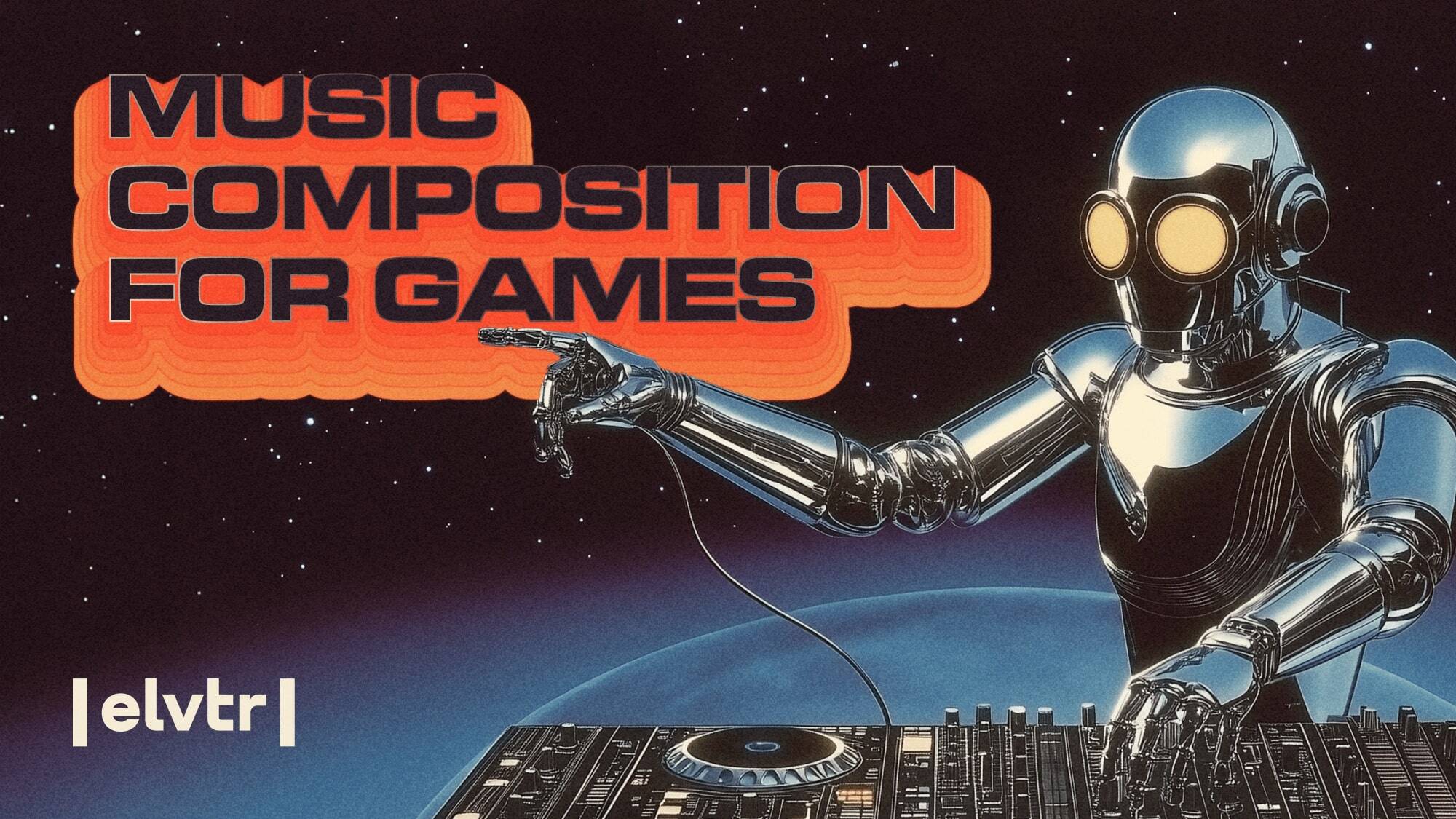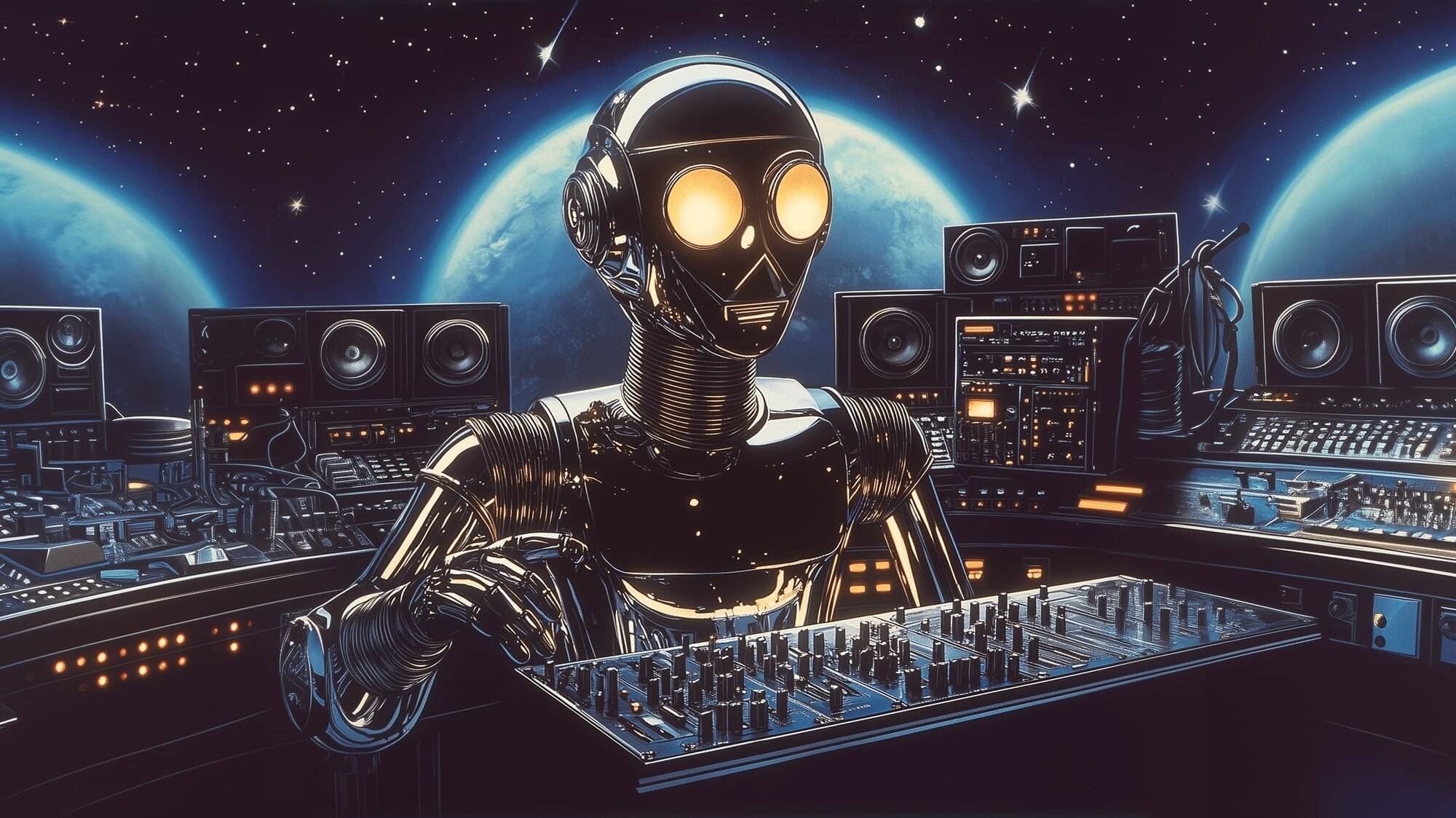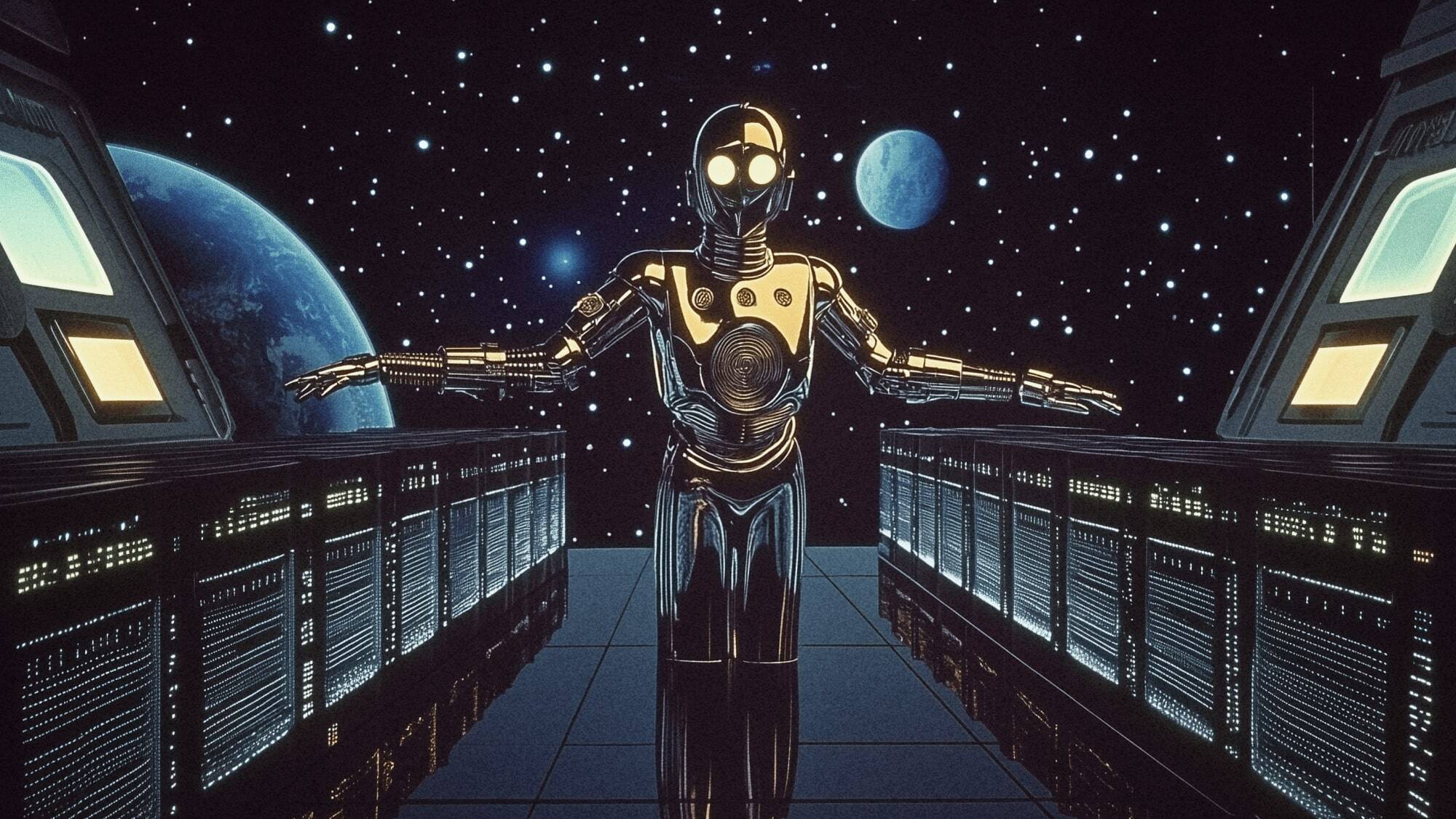- MAIN PAGE
- – elvtr magazine – Breaking into the Video Game Music Industry: A Beginner's Guide
Breaking into the Video Game Music Industry: A Beginner's Guide

Imagine crafting the haunting melodies that echo through alien landscapes, or composing the heart-pounding rhythms that drive epic boss battles. Welcome to the world of video game music composition — a realm where creativity knows no bounds and innovation is the name of the game.
The video game music industry is experiencing unprecedented growth, with projections indicating a staggering market size of $2.7 billion by 2025. This surge reflects not only the expanding gaming market but also the increasing recognition of music's pivotal role in creating immersive gaming experiences.
In this guide, we'll equip you with the knowledge and insights needed to launch your career in this dynamic field. From mastering essential skills and exploring diverse career paths to uncovering insider tips for breaking into the industry, we'll provide a comprehensive roadmap for aspiring video game composers. Whether you're a classically trained musician or a self-taught producer, this article will serve as your first step towards turning your passion for music and gaming into a thrilling career.
Understanding the Video Game Music Landscape
The video game music industry is experiencing a period of unprecedented growth and transformation, mirroring the explosive expansion of the gaming sector as a whole. While specific data for the video game music market is limited, we can gain insights by looking at the broader gaming industry trends. The United States video game market, for instance, is projected to grow at a compound annual growth rate (CAGR) of 10.67% from 2024 to 2030. This robust growth in the overall gaming market suggests a parallel expansion in the demand for high-quality, immersive game music and sound design.
Current Industry Trends
The video game music landscape is evolving rapidly, driven by technological advancements and changing player expectations. While we don't have exact figures for the music sector, the growth in the broader gaming industry indicates increasing opportunities for audio professionals. This growth is fueled by several factors:
- Emerging Technologies: Virtual Reality (VR), Augmented Reality (AR), and Artificial Intelligence (AI) are revolutionizing game audio. VR and AR create immersive 3D soundscapes that respond to player movements and interactions, while AI is being used to generate adaptive music that changes dynamically based on gameplay.
- Mobile Gaming: The shift towards mobile platforms has created new challenges and opportunities for game composers and sound designers. Mobile games require audio that can adapt to shorter play sessions and varying device capabilities.
- Streaming and Cloud Gaming: As cloud gaming services grow, the demand for high-quality audio that can be streamed efficiently is increasing. This trend is pushing audio professionals to optimize their work for various bandwidth conditions.
Types of Roles in Video Game Music
The video game music industry offers a diverse range of career opportunities, each playing a crucial role in creating the overall audio experience:
- Composers: These creative professionals are responsible for writing original music that enhances the game's atmosphere, emotional impact, and player engagement. They work closely with game designers to ensure the music aligns with the game's narrative and gameplay mechanics.
- Sound Designers: Sound designers create and implement non-musical audio elements, such as environmental sounds, character voices, and special effects. They play a crucial role in building the game's auditory world and enhancing player immersion.
- Music Editors: These specialists focus on integrating composed music into the game, ensuring seamless transitions between different musical pieces based on gameplay events. They often work with adaptive music systems to create dynamic soundtracks.
- Audio Programmers: On the technical side, audio programmers develop and implement the systems that allow music and sound to function within the game engine. They work on audio middleware integration, optimization, and creating tools for other audio team members.
Career Paths: In-house vs. Freelance
As the video game industry continues to grow, professionals in game audio have two primary career paths to consider: in-house positions and freelance work. Each option offers distinct advantages and challenges:
In-house Careers:
- Stability: Regular salary and benefits provide financial security.
- Team Collaboration: Working closely with other departments fosters creativity and professional growth.
- Long-term Projects: Opportunity to work on large-scale, AAA titles over extended periods.
- Career Progression: Clear path for advancement within the company structure.
Freelance Careers:
- Flexibility: Freedom to choose projects and manage work schedules.
- Diverse Portfolio: Opportunity to work on a wide range of games across different genres and platforms.
- Higher Earning Potential: Possibility of higher income, especially for established professionals with a strong reputation.
- Entrepreneurial Experience: Develop business skills while managing client relationships and personal brand.
The choice between in-house and freelance work often depends on individual preferences, career goals, and market conditions. Many professionals find success by starting in-house to gain experience and industry connections before transitioning to freelance work.
As the video game industry continues its upward trajectory, the demand for skilled audio professionals is likely to grow in tandem. The increasing recognition of music and sound as integral components of the gaming experience suggests a bright future for those looking to break into or advance within the video game music industry. Whether choosing an in-house position or a freelance career, professionals in this field have the exciting opportunity to shape the soundscapes of virtual worlds and contribute to the ever-evolving landscape of interactive entertainment.
Essential Skills for Video Game Music Composers
In the dynamic world of video game music composition, success hinges on a diverse set of skills that extend far beyond musical talent alone. Aspiring composers must cultivate a unique blend of creative, technical, and professional abilities to thrive in this competitive industry. This chapter explores the essential skills that every video game music composer should develop to excel in their craft and build a successful career.
Musical Versatility
At the heart of a video game composer's toolkit lies musical versatility. The ability to adapt to various game genres is crucial, as each type of game demands a distinct musical approach. Action games might require intense, adrenaline-pumping scores, while adventure games could call for sweeping, cinematic soundscapes. RPGs often need expansive musical worlds that evolve with the player's journey, and indie games might seek unique, experimental sounds that set them apart.
To enhance their versatility, composers should:
- Regularly explore and study different musical styles, from classical to electronic and everything in between.
- Collaborate with musicians from diverse backgrounds to broaden their musical horizons.
- Utilize online resources, such as masterclasses and tutorials, to learn new composition techniques and styles.
- Practice composing for hypothetical game scenarios across various genres to build a diverse portfolio.
By developing this adaptability, composers not only increase their marketability but also position themselves to take on a wide range of exciting projects throughout their careers.
Technical Proficiency
In the contemporary digital environment, technical proficiency is as essential as musical aptitude for video game composers. Proficiency in key software tools is imperative:
- Digital Audio Workstations (DAWs): Proficiency in industry-standard DAWs like Pro Tools, Logic Pro, or Ableton Live is crucial for composing, recording, and producing high-quality game music.
- Audio Middleware: Understanding tools like FMOD and Wwise is vital for creating adaptive and interactive music that responds dynamically to gameplay.
- Game Engines: Basic knowledge of popular engines such as Unity and Unreal Engine can greatly enhance a composer's ability to integrate their music effectively into games.
Moreover, basic coding skills can be a significant asset. While not always necessary, familiarity with languages like JavaScript or C# can help composers better understand the technical aspects of game development and facilitate smoother integration of their music into the game's systems.
To develop these technical skills:
- Invest time in learning and practicing with different software tools.
- Attend workshops or online courses focused on game audio implementation.
- Experiment with creating simple games or interactive audio experiences to understand the technical pipeline.
Game Design Understanding
A solid grasp of game design principles is crucial for creating music that truly enhances the gaming experience. Composers need to understand how game mechanics influence music composition, particularly in the context of adaptive and interactive soundtracks. This knowledge allows them to create music that seamlessly integrates with gameplay, enhancing immersion and emotional impact.
Key aspects to focus on include:
- Learning the basics of game mechanics and how they relate to player experience.
- Understanding the principles of adaptive music and how it can respond to in-game events and player actions.
- Studying successful examples of game soundtracks and analyzing how they interact with gameplay.
Equally important is the ability to collaborate effectively with game designers. Composers should strive to "speak the language" of game design, enabling clearer communication of ideas and more efficient collaboration. This might involve:
- Familiarizing oneself with game design terminology and concepts.
- Practicing the art of translating musical ideas into game design terms and vice versa.
- Actively seeking feedback and iterating on compositions based on the game's evolving design.
Business and Communication Skills
While often overlooked, business and communication skills are vital for a successful career in video game music composition. These skills encompass several key areas:
- Project Management: The ability to manage time effectively, meet deadlines, and juggle multiple projects is crucial in this fast-paced industry. Composers should develop strong organizational skills and learn to use project management tools to stay on top of their workload.
- Client Relations: Building and maintaining professional relationships is essential for long-term success. This involves clear communication, reliability, and the ability to interpret and fulfill client needs effectively.
- Negotiation Skills: As many composers work on a freelance basis, the ability to negotiate fair contracts and compensation is vital. This includes understanding industry standards, knowing one's worth, and communicating value effectively to potential clients.
- Networking: Building a strong professional network can lead to new opportunities and collaborations. Composers should actively participate in industry events, online forums, and professional associations.
To develop these skills:
- Attend industry conferences and workshops focused on the business side of game audio.
- Practice clear and professional communication in all interactions.
- Study basic business principles and contract negotiation techniques.
- Seek mentorship from experienced professionals in the field.
Remember, these skills are developed over time through consistent practice, learning, and real-world experience. Embrace every opportunity to grow and refine your abilities, and you'll be well on your way to a rewarding career in video game music composition.
Building Your Technical Arsenal
In the rapidly evolving world of video game music composition, having a robust technical skill set is as crucial as musical talent. This chapter explores the essential tools and technologies that aspiring game music composers should master to excel in their craft and seamlessly integrate their creations into modern games.
Digital Audio Workstations (DAWs)
At the heart of any composer's toolkit is the Digital Audio Workstation (DAW). These powerful software applications serve as the primary platform for composing, recording, editing, and producing music. While personal preference plays a significant role in DAW selection, several stand out as industry favorites:
- Ableton Live: Known for its intuitive interface and real-time composition capabilities, Ableton Live is particularly popular among electronic music producers and those creating adaptive game scores. Its Session View allows for quick experimentation with loops and layers, making it ideal for crafting dynamic game music.
- Logic Pro: Apple's professional-grade DAW offers a comprehensive suite of virtual instruments and effects, making it a favorite among composers who prefer an all-in-one solution. Its extensive sound library and scoring features are particularly useful for orchestral and cinematic game music.
- Cubase: Steinberg's Cubase is renowned for its advanced MIDI editing capabilities and overall versatility. Its powerful mixing and mastering tools make it a go-to choice for composers who handle the entire music production process.
Essential plugins and virtual instruments can significantly enhance the composing process. Some widely used options include:
- Kontakt (paid): A versatile sampler that hosts a vast array of virtual instruments.
- Omnisphere (paid): A powerful synthesizer known for its vast sound library and sound design capabilities.
- Spitfire LABS (free): Offers high-quality sampled instruments, perfect for adding orchestral elements to your compositions.
- Helm (free): A feature-rich synthesizer that's excellent for creating unique sound textures.
Middleware Mastery
Audio middleware serves as the bridge between composition and game integration, allowing for the creation of adaptive and interactive music systems. Two leading tools in this space are:
- Wwise: Developed by Audiokinetic, Wwise is widely used in the gaming industry. It offers a comprehensive set of tools for implementing dynamic audio, including features like real-time parameter controls and interactive music segmentation.
- FMOD: Another popular choice, FMOD provides a robust framework for creating adaptive music systems. It's known for its intuitive interface and seamless integration with major game engines.
To effectively use these tools, composers should:
- Familiarize themselves with concepts like layering, transitions, and parameter-driven audio events.
- Practice creating music that can be easily segmented and reassembled in real-time based on gameplay events.
- Experiment with interactive music systems that respond to player actions, game states, and environmental changes.
Game Engines
Understanding game engines is crucial for composers who want to ensure their music integrates seamlessly with the game environment. Two of the most popular engines are:
- Unity: Known for its versatility and ease of use, Unity has a robust audio implementation system. Composers can use Unity to:
- Import and organize audio assets efficiently.
- Set up audio sources and listeners in 3D space.
- Implement basic audio scripting for dynamic music changes.
- Unreal Engine: Renowned for its high-fidelity graphics, Unreal Engine also offers powerful audio tools. Key features for composers include:
- A node-based audio system for creating complex sound behaviors.
- Advanced spatialization tools for immersive 3D audio.
- Integration with middleware like Wwise for more complex audio implementations.
Best practices for audio implementation in game engines include:
- Optimizing audio assets for performance, considering file formats and compression techniques.
- Using distance-based attenuation and spatialization to create realistic 3D soundscapes.
- Implementing efficient audio pooling and prioritization systems to manage resources effectively.
By mastering these technical tools and understanding their application in game development, composers can significantly enhance their ability to create immersive, responsive musical experiences that truly bring games to life. Remember, while the learning curve may be steep, the payoff in terms of creative possibilities and professional opportunities is immense. Continual practice, experimentation, and staying updated with the latest developments in these technologies will be key to success in the dynamic field of video game music composition.
Crafting a Standout Portfolio
In the competitive world of video game music composition, your portfolio is your calling card. It's often the first impression you'll make on potential clients or employers, and it needs to effectively showcase your skills, versatility, and unique musical voice. This chapter will guide you through the process of creating a standout portfolio that can help launch your career in the video game music industry.
Diverse Demo Reel
Your demo reel is the centerpiece of your portfolio, offering a curated selection of your best work that demonstrates your capabilities as a composer. When structuring your demo reel, consider the following:
- Length and Structure: Aim for a total length of 3-5 minutes. Start and end with your strongest pieces to make a lasting impression. Use smooth transitions between tracks to maintain flow.
- Genre Diversity: Showcase your versatility by including tracks from different game genres (e.g., action, adventure, RPG, puzzle). This demonstrates your ability to adapt to various project needs.
- Technical Skills: Include pieces that highlight your proficiency with different instruments, production techniques, and your ability to create adaptive or interactive music.
- Quality over Quantity: It's better to have a shorter reel with exceptional pieces than a longer one with mediocre work. Each track should serve a purpose in demonstrating your skills.
- Context: If possible, include brief visual cues or text overlays that provide context for each piece (e.g., "Boss Battle Theme for Fantasy RPG").
Remember, the goal is to grab the listener's attention quickly and keep them engaged throughout. Regularly update your demo reel as you create new, high-quality work to ensure it always represents your current best.
Online Presence
A strong online presence is crucial for showcasing your portfolio and connecting with potential clients. Here's how to make the most of your online platforms:
- Professional Website:
- Design: Create a clean, professional-looking website that's easy to navigate. Consider using platforms like Wix or Squarespace if you're not familiar with web design.
- Content: Include an engaging bio that highlights your passion for game music and any relevant experience or education. Provide clear contact information and links to your social media profiles.
- Portfolio Section: Feature your demo reel prominently, along with individual tracks and any game projects you've worked on. Include brief descriptions for context.
- Blog or News Section: Regularly update this section with your latest projects, industry insights, or composition tips to demonstrate your ongoing engagement with the field.
- Platforms for Wider Reach:
- SoundCloud: Ideal for hosting your music. Organize your tracks into playlists based on genres or projects. Use relevant tags to improve discoverability.
- ArtStation: While primarily for visual artists, it's gaining popularity among game audio professionals. Create a profile showcasing your work, especially if you have any visual components (e.g., gameplay footage with your music).
- LinkedIn: Maintain a professional profile highlighting your skills and experience. Connect with other industry professionals and join relevant groups.
- Social Media Engagement:
- Twitter/X: Follow and engage with game developers, other composers, and industry figures. Share your work and insights regularly.
- YouTube: Consider creating a channel where you showcase your music with gameplay footage or discuss your composition process.
Remember to maintain a consistent brand across all platforms, using the same profile picture and bio to create a cohesive online presence.
Real-World Projects
While polished demo tracks are important, real-world project experience can significantly enhance your portfolio. Here are some ways to gain valuable experience and create portfolio-worthy content:
- Game Jams:
- Participate in online game jams (e.g., Ludum Dare, Global Game Jam) to create music under time constraints.
- These events offer networking opportunities with developers and showcase your ability to work efficiently.
- The unique constraints of game jams often lead to creative solutions that can make your portfolio stand out.
- Indie Game Collaborations:
- Reach out to indie developers on forums like TIGSource or Reddit's r/gameDevClassifieds to offer your services.
- Even if the projects are unpaid, they provide real game credits and the experience of working within a development team.
- These collaborations often allow for more creative freedom and the opportunity to experiment with different styles.
- Spec Tracks for Existing Games:
- Choose popular games or upcoming releases and create alternative music for specific scenes or levels.
- This demonstrates your ability to match existing game aesthetics and themes.
- When sharing these, clearly label them as spec work and respect copyright laws by not using game footage without permission.
- Personal Projects:
- Create a mock game trailer or cutscene and compose music for it.
- Develop an interactive music demo using middleware like Wwise or FMOD to showcase your technical skills.
When presenting these projects in your portfolio, provide context about your role, the project's constraints, and any unique challenges you overcame. If possible, include testimonials from developers you've worked with to add credibility to your work.
By crafting a diverse demo reel, maintaining a strong online presence, and showcasing real-world project experience, you'll create a standout portfolio that effectively demonstrates your skills and passion for video game music composition. Remember to continually update and refine your portfolio as you grow and evolve as a composer. Your portfolio is not just a collection of your past work, but a dynamic representation of your potential as a video game music composer.
Networking and Career Strategies
Building a successful career often hinges on your ability to network effectively and implement smart career strategies. This chapter explores key approaches to help you connect with industry professionals, showcase your work, and create opportunities for career growth.
Digital Networking
Digital platforms offer unprecedented opportunities for networking and self-promotion. Here's how to make the most of them:
- Social Media Strategies:
- Twitter/X: Follow and engage with game developers, audio directors, and fellow composers. Share your work, insights, and industry news regularly. Use relevant hashtags like #gameaudio and #indiedev to increase visibility.
- LinkedIn: Maintain a professional profile highlighting your skills and experience. Join groups related to game audio and participate in discussions. Share your latest projects and articles about game music composition.
- Instagram: Use this visual platform to share behind-the-scenes content of your composition process, snippets of your work, or photos from industry events you attend.
- Online Communities:
- Reddit: Participate in subreddits like r/gamedev, r/gameaudio, and r/composer. Share your knowledge, ask questions, and offer constructive feedback to others.
- Discord: Join game development and audio production servers. Many offer dedicated channels for sharing work, discussing techniques, and even finding collaboration opportunities.
- Game Audio Forums: Engage in communities like the Game Audio Network Guild (G.A.N.G.) forums to connect with professionals and stay updated on industry trends.
Remember, the key to effective digital networking is consistency and authenticity. Regularly share valuable content, engage in meaningful conversations, and be genuinely interested in others' work.
Industry Events and Conferences
Face-to-face networking remains invaluable in the game industry. Major events provide opportunities to learn, showcase your work, and make personal connections:
- Key Conferences:
- GameSoundCon: Focused specifically on game audio, this annual conference offers workshops, panels, and networking events tailored to composers and sound designers.
- Game Developers Conference (GDC): The largest professional game industry event, GDC features an audio track with talks from industry leaders and numerous networking opportunities.
- Local Game Developer Meetups: Many cities host regular gatherings for game developers, which can be excellent for meeting local professionals and indie developers.
- Networking Tips for Introverts:
- Prepare talking points: Have a brief introduction ready and a few conversation starters about current industry trends or recent games you've enjoyed.
- Set achievable goals: Aim to have 2-3 meaningful conversations rather than trying to meet everyone.
- Utilize quiet spaces: Many conferences offer designated quiet areas where you can have more focused conversations.
- Follow up: After the event, connect with people you met on LinkedIn or Twitter, referencing your conversation to reinforce the connection.
Breaking In: Entry-Level Opportunities
Landing your first professional gig can be challenging, but there are several paths to consider:
- Internships and Junior Positions:
- Many game studios and audio production companies offer internships or junior composer positions. These roles provide invaluable experience in professional workflows and team collaboration.
- Use job boards like Gamasutra and the G.A.N.G. career center to find these opportunities.
- Even if not directly composing, roles in QA testing for audio or as an audio implementation assistant can provide a foot in the door and exposure to the game audio pipeline.
- Freelancing Platforms:
- Websites like Upwork and Fiverr can be starting points for finding game audio gigs. While often lower-paying initially, they can help build your portfolio and client base.
- AudioJungle and Pond5 allow you to sell stock music, which can generate passive income and potentially catch the attention of game developers.
- Remember to always deliver high-quality work, as positive reviews on these platforms can lead to better opportunities.
- Indie Game Collaborations:
- Websites like IndieDB and itch.io are great for finding indie developers looking for composers.
- Offer your services to promising projects, even if for reduced rates or revenue share. The completed games will serve as powerful portfolio pieces.
As you navigate these networking and career strategies, remember that persistence is key. Building a career in video game music composition takes time, but by consistently putting yourself out there, honing your skills, and fostering genuine connections, you'll be well on your way to achieving your goals in this exciting and dynamic field.
The Business Side of Game Music
Understanding Contracts
Understanding contracts is crucial for protecting your rights and ensuring fair compensation. Key elements of a game music contract typically include:
- Scope of Work: Clearly defined expectations for the music to be created, including number of tracks, length, and style.
- Ownership and Rights: Specifies who owns the final music and what rights the composer retains.
- Delivery Timeline: Outlines deadlines for drafts, revisions, and final delivery.
- Payment Terms: Details on compensation, including any upfront fees and payment schedule.
- Revisions: Clarifies the number of revisions included and costs for additional changes.
Licensing models in game music contracts generally fall into two categories:
- Work-for-hire: The composer is paid a flat fee, and the game company owns all rights to the music. This model offers upfront payment but limits long-term earning potential.
- Royalty-based: The composer retains some ownership rights and receives ongoing payments based on game sales or usage. While potentially more lucrative, this model involves more risk and delayed compensation.
Setting Your Rates
Determining appropriate rates for your work is a balancing act between market standards, your experience, and project requirements. Consider these factors:
- Project Type: AAA titles typically offer higher budgets compared to indie or mobile games.
- Scope: Consider the number of minutes of music required and the complexity of the compositions.
- Usage: Factor in whether the music will be used solely in-game or also in marketing materials.
- Your Experience: More established composers can command higher rates.
Industry rates vary widely, but as a general guideline:
- Indie games: $50-$500 per minute of music
- Mid-tier games: $500-$1500 per minute
- AAA titles: $1000-$2500+ per minute
When negotiating, focus on the value you bring to the project. Highlight your unique style, past successes, and any additional skills (like implementation knowledge) that set you apart. Be prepared to justify your rates with concrete examples of your work and its impact on previous games.
Copyright and Royalties
Understanding copyright law is essential for protecting your creative work. In most countries, copyright is automatically granted to the creator upon the work's completion. However, work-for-hire agreements often transfer this copyright to the game company.
For royalty-based arrangements, composers can earn additional income through:
- Performance Royalties: Paid when music is played publicly, including in-game music on streaming platforms.
- Mechanical Royalties: Generated from the reproduction of music, such as game soundtrack sales.
Royalty collection societies play a crucial role in managing these payments. In the US, major societies include:
- ASCAP (American Society of Composers, Authors, and Publishers)
- BMI (Broadcast Music, Inc.)
- SESAC (Society of European Stage Authors and Composers)
To ensure proper compensation:
- Register with a collection society in your region.
- Register each of your compositions with the society.
- Keep detailed records of where and how your music is used.
- Understand that video game music often falls under "interactive" categories, which may have different royalty structures.
By mastering these business aspects, composers can focus on their creative work while ensuring they're fairly compensated and protected in the competitive world of game music composition.
Additional Resources
For aspiring video game music composers, continuous learning and community engagement are crucial. Recommended books include "A Composer's Guide to Game Music" by Winifred Phillips and "The Essential Guide to Game Audio" by Steve Horowitz. Online communities like the Game Audio Network Guild (G.A.N.G.) forums and the r/gamecomposers subreddit offer valuable networking and feedback opportunities.
Online courses can significantly enhance your skills. Our course Music Composition for Games provides comprehensive insights into game music composition. Berklee Online and Coursera also offer relevant courses in game audio and interactive composition.
Stay updated with industry trends by following publications like Gamasutra's Audio section and the Game Developer magazine. Blogs such as Designing Sound and The Sound Architect offer in-depth articles and interviews with industry professionals. These resources provide ongoing education and keep you informed about the latest developments in game music composition, helping you stay competitive in this dynamic field.
Conclusion
Breaking into the video game music industry requires a multifaceted approach. Aspiring composers should focus on building a diverse portfolio, mastering essential technical skills, and understanding the business aspects of game music. Networking, both online and at industry events, is crucial for creating opportunities and building relationships with developers and fellow composers.
Remember, success in this competitive field doesn't happen overnight. Persistence, continuous learning, and adaptability are key to navigating the ever-evolving landscape of game audio. Embrace challenges as opportunities to grow and refine your craft.
Take the next step in your journey by seeking internships with game studios, participating in game jams to build your portfolio, and actively engaging with the game audio community on social media and forums. Connect with experienced professionals, share your work, and stay updated on industry trends. With dedication and the right strategies, you can turn your passion for game music into a thriving career.









